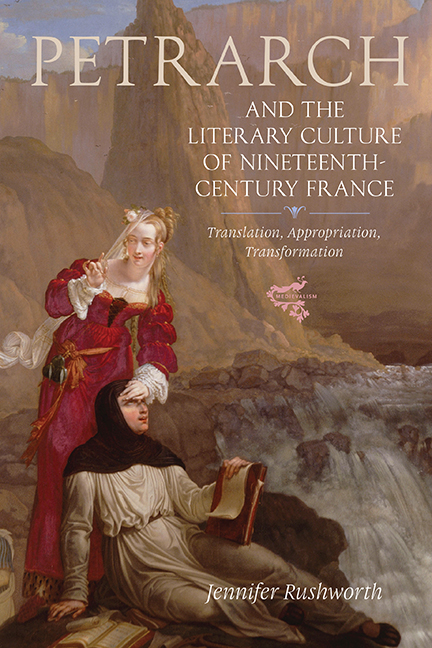 Petrarch and the Literary Culture of Nineteenth-Century France
Petrarch and the Literary Culture of Nineteenth-Century France Published online by Cambridge University Press: 09 May 2017
The nineteenth century needed its own Petrarch.
(Alphonse de Lamartine)THE MEDIEVAL ITALIAN poet Francesco Petrarca (known in English as Petrarch, in French as Pétrarque) is a chameleon-like, nomadic figure. Temporally, his life spanned the end of the Middle Ages and the start of the Renaissance, and he has accordingly been hailed both as ‘the last troubadour’ and ‘the first modern man’. Geographically, he was a wanderer, ‘a restless tourist’, born in exile in Arezzo on 20 July 1304, raised in Carpentras, educated at Montpellier and Bologna, and a frequent presence alternately at the papal court of Avignon and in the rural idyll of Fontaine-de-Vaucluse, this last known to Petrarch simply as Vaucluse. In September 1340, Petrarch received invitations to receive the laurel crown from both Rome and Paris, a sign of his growing reputation even in his life- time. In later life he made a home for himself in a variety of northern Italian cities, particularly Milan, Padua, Parma, Pavia, and Venice. He spent his final years in Arqua, a village in the Euganean Hills, where he died on 19 July 1374, on the eve of his seventieth birthday, and where he was also laid to rest. In his writings, similarly, Petrarch crossed boundaries of both language and genre, producing work in Italian and Latin, in poetry and prose, with regard to matters in turn religious, historical, poetic, and moral.The editor and translator of Petrarch's Bucolicum carmen (Bucolic Poem), a series of twelve allegorical poems in Latin, wrote that in these texts ‘there is something for everyone’, and we might well extend this statement to the whole of Petrarch's varied oeuvre, thanks to its breadth of scope and interest. Yet despite this variety and richness, the Petrarch that has been handed down by tradition is Petrarch the love poet, author of celebrated sonnets in Italian. It is the Petrarchan sonnet, more than any other part of his work, which has entranced and seduced readers, writers, and translators over the centuries.
The aims of this volume are to explore the specifically French motivation behind the reception of Petrarch in the nineteenth century and to investigate the different forms that this reception took. Within the field of reception studies, this book takes a twofold methodological approach.
To save this book to your Kindle, first ensure no-reply@cambridge.org is added to your Approved Personal Document E-mail List under your Personal Document Settings on the Manage Your Content and Devices page of your Amazon account. Then enter the ‘name’ part of your Kindle email address below. Find out more about saving to your Kindle.
Note you can select to save to either the @free.kindle.com or @kindle.com variations. ‘@free.kindle.com’ emails are free but can only be saved to your device when it is connected to wi-fi. ‘@kindle.com’ emails can be delivered even when you are not connected to wi-fi, but note that service fees apply.
Find out more about the Kindle Personal Document Service.
To save content items to your account, please confirm that you agree to abide by our usage policies. If this is the first time you use this feature, you will be asked to authorise Cambridge Core to connect with your account. Find out more about saving content to Dropbox.
To save content items to your account, please confirm that you agree to abide by our usage policies. If this is the first time you use this feature, you will be asked to authorise Cambridge Core to connect with your account. Find out more about saving content to Google Drive.